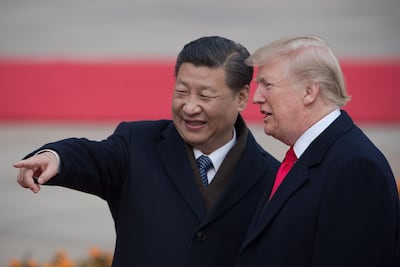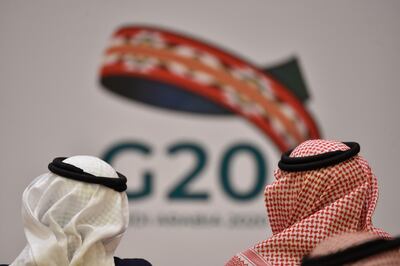If G20 leaders are to prevent the coronavirus pandemic from turning a global health emergency into an economic catastrophe, then they need to summon the same spirit of international co-operation that helped to resolve the 2008 financial crisis.
The emergency summit of G20 leaders convened this week under the auspices of Saudi Arabia, the organisation’s current chair, marks the first time it has been held in the midst of an international crisis since the 2009 summit held in London to tackle the global financial meltdown caused by the banking crisis. On that occasion, the ability of the 23 participating nations to reach unanimous agreement on the economic measures needed to restore confidence in global markets succeeded in stabilising the financial crisis
There is now a pressing need for world leaders to find a similar level of international co-operation to tackle the coronavirus pandemic, which has so far infected nearly half a million people worldwide, while claiming the lives of around 20,000 people.
The objectives of the latest summit, which was convened by video conference as a safety precaution and also involved the UAE, were set out by its Saudi host, King Salman, who wrote on Twitter: “As the world confronts the Covid-19 pandemic and the challenges to the healthcare systems and the global economy, we reconvene this extraordinary G20 summit to unite efforts towards a global response.”
While the primary concern is tackling the health priorities to have arisen as a result of the pandemic – such as providing sufficient numbers of protective clothing and ventilators to affected nations – it is also essential that there is greater international co-operation on tackling the economic fallout from the pandemic, which has sparked a collapse in the value of global markets, threatening the livelihoods of tens of millions of people.
This has prompted UN Secretary General Antonio Guterres to call on the G20, which comprises 19 of the world’s major industrialised nations and the European Union, to fund a stimulus package worth trillions of dollars for businesses, workers and households, especially in developing countries. Mr Guterres argues that creating a package of this nature was a matter of “enlightened self-interest”, as it would help to prevent the virus from spreading and ultimately making a comeback. It would also help to alleviate the economic hardship created by the pandemic.
There is certainly an acknowledgement among leaders that the pandemic poses a threat to humanity. A draft statement prepared on the eve of the summit called for the establishment of an international mechanism to share information and experiences in fighting the disease.
The problem for world leaders, though, is that, to date, global co-operation between the world’s major powers has been in short supply, with affected countries preferring to act unilaterally in tackling the crisis, rather than pooling resources to defeat a common enemy.
It has resulted in nations implementing their own independent financial packages, such as cutting interest rates and introducing fiscal stimulus, to prevent deeper economic hardship.
Moreover, the lack of global co-operation has led to an increase in tensions that makes the task of tackling the virus all the more difficult. In Europe, for example, this has resulted in countries such as Germany and Austria appearing reluctant to assist fellow EU member states such as Italy. Nor is it helpful that an increasingly acrimonious spat has developed between the US and China over who is to blame for causing the pandemic.
This week’s summit of G7 leaders, which was supposed to provide a framework for the G20 meeting, failed to reach an accord after US Secretary of State Mike Pompeo insisted that the pandemic be referred to as “the Wuhan virus” in the final communique, a move guaranteed to provoke the ire of the Chinese and meant the summit ended without reaching an accord.
Washington has been taking an increasingly aggressive stance towards Beijing after senior officials at the Chinese foreign ministry suggested that the virus might have originated from an American military delegation that visited Wuhan, the Chinese city in Hubei province identified as the initial centre of the virus, last October.
The Trump administration has reacted angrily to what it claims are Beijing’s attempts to deflect blame away from China for causing the pandemic, and has accused China of mounting an “intentional disinformation campaign".
Commenting on the G7 meeting at a media briefing in Washington, Mr Pompeo said the world still needed accurate information about the outbreak from Beijing, and called on China to show full transparency.

"That means full transparency by everyone, including by the Chinese Communist Party,” Mr Pompeo said. “This is a continuing challenge, we still need good information from the Chinese Communist Party about what is taking place there."
There are now suggestions that the two countries are prepared to set aside their differences, which is welcome news as the virus takes an increasingly deadly toll, with large swathes of the global economy being forced into lockdown. For, rather than indulging in the isolationist approach that has so far characterised the response of the major powers, global bodies such as G20 need to formulate a concerned global effort to tackle the pandemic.
For example, there needs to be international co-operation to develop, manufacture and distribute vaccines and treatments. Other essential equipment, such as testing kits, ventilators, cleaning materials and protective equipment must be made available to all nations battling the virus, rather than independent states indulging in dog-eat-dog bidding wars against each other.
The Covid-19 virus does not respect borders, which is why the overriding priority now must be for nations to come together to act for the common good, not national self-interest.
Con Coughlin is the Telegraph’s defence and foreign affairs editor



